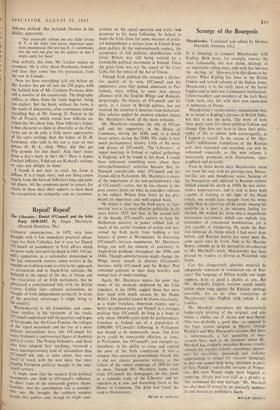Repeal! Repeal!
CATIIOLIC emancipation, in 1829, may have brought with it few immediate practical advan- tages for Irish Catholics, but it won for Daniel O'Connell an ascendancy in Irish affairs which he never really lost until his death in 1847. O'Con- nell's reputation, as a nationalist, diminished in the late nineteenth century, when writers in the republican tradition came to criticise his approach to nationalism and to Anglo-Irish relations. He believed in the repeal of the Act of Union and the restoration of an Irish parliament, but he advocated a constitutional link with the British Crown. Unlike later cultural nationalists, he thought of Irish independence primarily in terms of the practical advantages it might bring to the country.
Warm-hearted in his friendships and some- ' times ruthless in his treatment of his rivals, O'Connell understood well the passions and hopes of his people, but the Great Famine, the collapse of the repeal.movement and the rise of a more militant nationalism have left O'Connell for many Irishmen a controversial figure of doubtful Political virtue. The Young Irelanders, and those who later adopted their teachings, favoured a More uncompromising kind of nationalism than O'Connell did, and, to some extent, they were more in touch with the new ideas that were shaping European political thought in the nine- teenth century. It might seem that the modern Irish political movements owe little to O'Connell's influence. A closer study of the nineteenth century shows, however, that his contribution was a consider- . able one. He brought the ordinary country People into politics and, though he might corn-
promise on the repeal question and make rash promises to his mass following, he helped to make the Irish claim for some measure of politi- cal independence a serious issue in United King- dom politics. In the mid-nineteenth century, the acceptance of full political identification with Great Britain was still being resisted by a formidable political movement in Ireland. There the great issue was not the repeal of the Corn Laws, but the repeal of the Act of Union.
- Though Irish political life retained a distinc- tive quality of its own, O'Connell and his supporters, once they gained admission to Par- liament, were willing to enter into uneasy alliances with the English Whigs and Radicals. Surprisingly, the history of O'Connell and his party, as a factor in British politics, has not received the attention it deserves from historians. This relative neglect by modern scholars makes Mr. Macintyre's book all the more welcome.
Mr. Macintyre examines the role of O'Con- nell and his supporters, in the House of Commons, during the 1830s and, to a much lesser extent, during the 1840s. His study is very much parliamentary history. Little of the noise and drama of O'Connell, `The Liberator,' at repeal meetings in Ireland or radical gatherings in England, will be found in this book. I would have welcomed something more about these extra-parliamentary activities because they in- fluenced considerably what O'Connell and his friends did in Parliament. Mr. Macintyre is aware of the importance of the non-parliamentary side of O'Connell's career, but he has chosen to im- pose austere limits on what he considers relevant to his subject. Within these limits he •has pro duced an important and well-argued book.
He makes it clear that the Irish party or 'con- nection' was at its most effective politically in the years before 1835, but that, in the second half of the decade, O'Connell's anxiety to keep the Melbourne ministry in power robbed him of much of his earlier freedom of action and pre- vented the Irish party from holding a real balance of power at Westminster. In discussing O'Connell's intricate manmuvres, Mr. Macintyre brings, out well the element of continuity in Anglo-Irish problems throughout the 1830s and 1840s. Though administrations might change, the Whigs never ceased to distrust O'Connell's motives, while O'Connell and Sir Robert Peel remained constant in their deep hostility and mutual lack of understanding.
Again, Mr. Macintyre makes the point that many of the methods employed by the Irish repeaters, in the 1830s, suggest those that were later used with much success by the Home Rulers. The parallel cannot be drawn too closely, as a wider franchise, American money, and a better disciplined party put Parnell in a stronger position than O'Connell. As long as a body of only about 100,000 voters held the parliamentary franchise in Ireland out of a population of 8,000,000, O'Connell's following in Parliament was bound to be numerically weak. The Irish party could be remarkably effective, at times, in Parliament. but O'Connell's real strength, lay elsewhere; in his ability to rouse and control the poor of the Irish countryside. It was a weapon that successive governments feared, but it did not always guarantee victory, as the failure of the repeal campaign of 1843-44 was to show. Though Mr. Macintyre keeps away from O'Connell the demagogue, he has given us a valuable study of the Liberator and his repeaters as a new and disturbing force in the House of Commons. The Irish had found the road to Westminster.
KEVIN B. NOWLAN






























 Previous page
Previous page